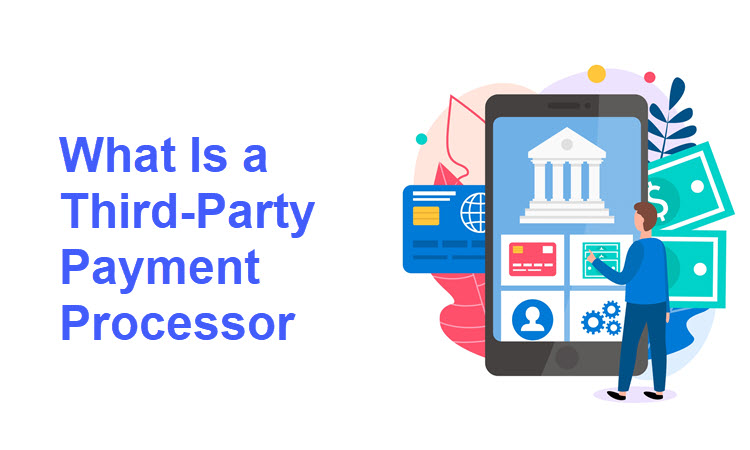Small and medium-sized businesses have two options when it comes to accepting online payments.
They can open a domestic or international merchant account in a bank and handle these transactions independently. It’s the more complicated option due to the stringent regulations and high upfront costs involved.
The other option is to work with a third-party payment processor that help businesses obtain merchant accounts and start processing payments easily. In this case, there are no high upfront costs and fees are based on the volume of transactions.
In this article, we’ll explain what a third-party payment processor is and how merchants can use their services.
Third-Party Payment Processor Definition

A third-party payment processor is a financial entity that provides payment processing services to merchants. This payment authority makes it simple for merchants to start accepting payments without the hassle of obtaining their own merchant account with a bank.
A merchant account is a bank account that a business uses to receive electronic payments. Merchants either open their own merchant account or work with a third-party payment processor to start accepting payments through the processor’s merchant account.
Registering a merchant account takes many months and requires obtaining and providing extensive documentation as well as paying costly upfront fees.
Third-party payment processors are practical solutions for all small and medium-sized businesses. They can focus on their core business activities and start processing payments in a matter of days or weeks, not months.
How Do Third-Party Payment Processors Work?
When a merchant works with a third-party payment processor, all payments made to the business are processed through the payment processor’s merchant account. This entity has an agreement with an acquiring bank to process payments for its merchants.
Note: On some occasions, third-party payment processors can open separate bank accounts for merchants to process their payments.
Third-party payment processors are especially valuable for high-risk businesses. Most banks and financial institutions are highly reluctant to process high risk payments due to the delicate nature of the merchant’s business. Third-party payment processors take on the risk and vouch for high-risk merchants.
Third-Party Payment Processor Regulation

Acquiring banks working with third-party payment processors carefully monitor the processor’s client portfolio and risk levels.
Any payment processing involves risk of fraud schemes, money laundering, identity theft, and other prohibited transactions. Hence, payment processors screen each new merchant thoroughly and implement security measures, such as 3DS and SCA, and strict policies to protect themselves and their merchants from illicit payments.
Payment processors working with high-risk businesses must track their chargeback ratio carefully. Additionally, they proactively monitor for suspicious activities, especially in card-not-present transactions.
Advantages and Disadvantages of Third-Party Payment Processor

Using a third-party payment processor brings certain advantages and disadvantages, as follows.
Advantages
Merchants working with payment processors experience the following benefits:
- No upfront costs. Most payment processors charge fees only for transactions they carry out. It requires no registration fee, termination fee, annual fee or other expenses that would be otherwise incurred.
- No minimum transaction volume. Merchant account providers often require you process a minimum transaction volume each month. That is not the case with third-party payment processors.
- Simple setup. When merchants opt for a third-party payment processor, they don’t need to deal with any other procedure. The payment processor does all the paperwork and mediates with other financial institutions.
- Ready-made technology. Payment processors provide all the technology necessary to start accepting payments. Great processors provide an API and third-party integrations for popular content management systems, such as Magento and WooCommerce.
- Contract flexibility. Opening a merchant account in a bank as a business entity typically includes long-term contracts. Payment processors offer short-term contracts and more flexibility.
- Business convenience. Merchants don’t waste their time on payment processing regulations and can entirely focus on their core business activities. Payment processors have risk and legal teams that do the heavy lifting.
- Effective customer support. Good third-party payment processors provide 24/7 support to its merchants’ customers. It ensures providing timely responses and resolving various issues.
- Processing payments worldwide. Third-party payment processors typically work with different currencies and process international transactions, enabling merchants to target global audiences.
- PCI compliance and security. You don’t have to worry about compliance and payment security. Payment processors maintain secure environments for payment processing and keep your business safe and sound.
- Fraud prevention. Third-party payment processors deal with large payment volumes. Based on their payment track record and business data, they use various security mechanisms to identify potential fraud or scams.
- Better user experience. Payment processors provide merchants with user-friendly checkout pages that ensure a smooth user experience. As such, they add to payment success and reduce cart abandonment.
- Managing disputes and complaints. Most small and mid-sized businesses don’t have enough resources to deal with payment disputes and complaints. Third-party payment processors are here to cope with these procedures on their behalf.
Disadvantages
There are some disadvantages of using third-party payment processors, as well:
- Higher fees for more transactions. As your business grows and you start receiving more payments, you spend more money on transaction fees.
- Adhering to payment processor’s terms and conditions. A potential disadvantage is that you need to follow the payment processor’s rules and regulations, which might hinder your opportunities to diversify the business.
Do I Need a Third-Party Payment Processor?

If you’re a small or mid-sized business starting a venture that receives varying volumes of payments each month, working with a third-party payment processor is the wise choice.
Third-party payment processors charge based on the transaction volume so you don’t have to pay monthly or setup fees, which banks usually charge for merchant accounts.
Third-party payment processors are also a good option for businesses that want to start receiving payments as soon as possible. Each payment processor has a streamlined onboarding process so merchants can start accepting payments as soon as possible.
Finally, for many high-risk businesses, working with a third-party payment processor is the only way to collect payments online.
On the other hand, larger businesses that accept higher volumes of transactions benefit more from having their own merchant account since transaction fees add up.
Conclusion
Third-party payment processors are here to help business owners accept customer payments fast and effectively.
However, every merchant needs to find more about their roles and services before selecting a suitable payment processor for their business needs.
This guide provides valuable information that will help merchants conclude whether and how to use third-party payment processors.
